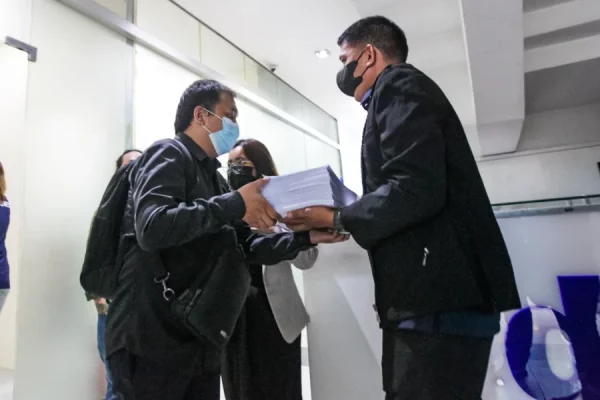Top plastic polluters Coca Cola, 6 other retail giants sued for dangerous plastic packaging, false ‘recyclable plastic’ ads
By: C-Help Team
32 Filipino consumers filed a complaint today at the Department of Trade and Industry (DTI) Fair Trade Enforcement Bureau-Mediation and Adjudication Bureau against Coca Cola, Pepsi Cola, Nestle, Unilever, Procter and Gamble, Colgate Palmolive and Universal Robina Corp (URC).
The consumers are asking the DTI to require the seven retail giants to stop further plastic packaging because it is dangerous. They also ask these corporations to correct or remove the “recycle me” label, and other recycling words, marks and symbols on their plastic bottles, packets, tubes and sachet because these are false and misleading. They demand the corporations to replace their packaging and invest on reuse and refillable systems of product delivery, and refund the premium they paid for the recyclability claim.
These corporations, except URC, are known global plastic polluters because their product brands have been found in most wastes collected and audited during annual brand audits in the Philippines and the world since 2018. The Coca-Cola Company, PepsiCo, and Nestlé come in as the world’s top plastic polluters for five years running.
URC, on the other hand, has consistently figured in the top five plastic polluters in the Philippines based on annual national brand audits since 2018.
Consumers opine that since these companies have consistently featured in the list of leading plastic polluters globally, between 2018-22, their positive action may bring about a significant change while their inaction will worsen the massive plastic pollution in the country, and the world.
According to the consumers, plastic packets, tubes and sachets are comprised of multiple layers of different types of materials, adhesives, and dyes that make any of these impossible to recycle. They also pointed out that the plastic labels and caps on the bottles are not recyclable. Besides, there is no recycling system and structure at sufficient scale in the Philippines. Thus, ‘recycle me’ label is false and misleading.
Because the plastics are not recyclable, the complainants say that the undeterred production and use of plastic packaging contributed, in a major way, to the massive plastic pollution in the Philippines, and the world.
“The corporations’ continued use of misleading and deceptive recyclability claims on their product labels and websites violate our consumer rights to information, safety and healthy environment. It falsely and deceptively informs us and other Filipino consumers that we are making an environmentally responsible choice when we purchase and dispose of their plastic packaging in the barangay, municipal or city recycling bins and materials recovery facilities (MRFs)”, said student and complainant Jade Carlyn Esguerra.
“Truth is”, declared another complainant Cesar Carlito Baclagon, “the use of plastic in product packaging is dangerous and it is damaging the environment even when we and other consumers properly dispose of these plastic containers.”
According to non-profit group EcoWaste Coalition, in making plastics, hazardous substances such as polybrominated diphenyl ethers, phthalate plasticizers, grease, polyfluoroalkyl substances, ultraviolet stabilizers and heavy metals such as cadmium and lead leach into food, soil and water. A 2022 study[1] also found microplastics in human blood.
The dangerous packaging also affected Pablo Rosales, a fisherman in Manila Bay and chair of fisherfolks group PANGISDA Pilipinas. He said, “We fisherfolks joined the complaint because we are a witness to the plastics damaging the mangroves and the propellers of our fishing boats, and the small plastics being eaten by fishes.”
Former Senator Orlando Mercado who is also one of the complainants argued, “If we, the complainants, and other consumers knew the truth, we could make informed decisions and avoid purchasing products that have dangerous packaging or are damaging the environment.”
The complainants are asking for a refund of the 37% premium on the purchase price they paid for the corporations’ products because of the perceived added value, inducement or incentive. “We thought the products are recyclable but they are not, that’s why the corporations should return the environmental claim premium,” added complainant Edlyn Rosales, a fisherwoman and fish dryer.
The products included in the complaint are Coca Cola light, original, zero and sakto; Royal; Wilkins distilled water; Minute Maid juice; Eight o’ Clock; Pepsi Cola, Mirinda and Mountain Dew soft drinks; Sting; Unilever’s Surf, Dove, Sunsilk, and Clear men shampoo; Pepsodent; Knorr soup; Best Foods; Lady’s Choice; P&G’s Oral B toothpaste, Safeguard liquid soap and Head and Shoulder shampoo; Nestle’s Bearbrand, Nestea, Nesquick, Kitkat, Coffeemate, Lipton, Chuckie and Magic Sarap; Colgate Palmolive shampoo, toothbrush, toothpaste and mouthwash; and URC’s Nova, Piattos, Mr. Chips, Jack and Jill, Nips, Cloud Nine, VCut, Maxx, Presto, Cream-O and C2 solo. (30)

Discovery and Quantification of Plastic Particle Pollution published in the journal Environment International. See https://www.sciencedirect.com/science/article/pii/S0160412022001258
